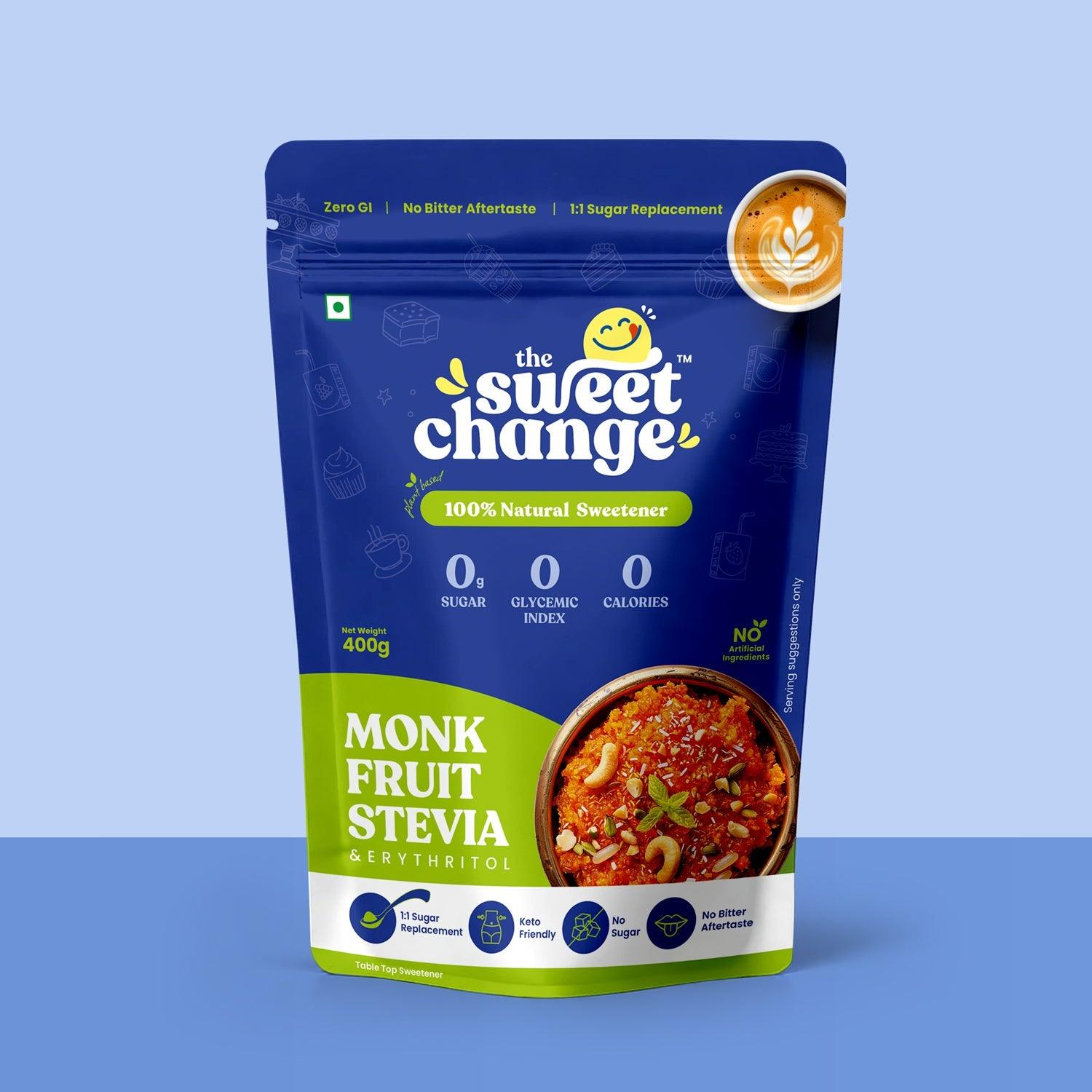
Erythritol - A Nutritionist’s Guide to This Zero-Calorie Sweetener.
Share
What is Erythritol?
Erythritol is a naturally occurring sugar alcohol found in small quantities in fruits like grapes, melons, and pears. Structurally similar to sugar, it mimics sugar’s appearance and taste, but with nearly zero calories. Commercially, erythritol is produced via a natural fermentation process using yeast and glucose, similar to the way bread and cheese are made.
What makes erythritol stand out? It has:
● 70% the sweetness of sugar
● Zero calories per gram (vs. 4 cal/g in sugar)
● A glycemic index of 0, making it ideal for diabetics
● No spike in insulin or blood sugar levels
Why do we use Erythritol in The Sweet Change?
Monk fruit is incredibly sweet up to 200x sweeter than sugar. But on its own, it lacks the volume, texture, and familiarity that sugar provides. That’s where erythritol comes in. When blended with monk fruit, erythritol:
● Adds body and bulk for cooking and baking
● Balances monk fruit's intense sweetness
● Mimics sugar’s mouthfeel and taste
● Delivers a perfect 1:1 sugar replacement
Together, monk fruit and erythritol give you the joy of sweetness without the calories, carbs, or insulin spike.
Is Erythritol Safe? What Science and Experts Say
Erythritol is one of the most widely studied sugar alcohols, and it’s considered safe by major global health organizations.
Let’s break down the science behind its safety and address recent concerns.
1. Approved by WHO & FDA
Erythritol is Generally Recognized as Safe (GRAS) by the U.S. FDA, and it has received the highest safety rating from the World Health Organization (WHO) for over two decades. It’s been used safely across the U.S, Japan, and Europe for more than 30 years.
2. How Erythritol Is Metabolized in the Body
Unlike other sugar alcohols (like xylitol or sorbitol), erythritol behaves differently in your body:
● 90% of erythritol is absorbed in the small intestine.
● It does not spike blood sugar or insulin levels.
● It's excreted unchanged in urine, meaning your body doesn’t metabolize it for energy or store it as fat.
That’s why erythritol is considered diabetic-friendly and weight-loss safe.
3. Well-Tolerated in Daily Use
Most people can safely consume erythritol every day.
● Scientific studies show that it’s well-tolerated up to 0.8 g per kg body weight per day.
For example, a 70 kg adult can safely consume approximately 46 to 56 grams of erythritol per day. This daily limit is well above the average amount typically used in tea, coffee, or home baking recipes, which usually require just 2 to 5 grams per serving.
4. Is Erythritol Safe for Your Heart?
Debunking the 2023 Blood Clot Study Witkowski M et al., Nature Medicine, 2023 In 2023, a study published in Nature Medicine sparked controversy by linking erythritol, a popular natural sweetener, with increased risk of heart attacks and blood clots. But does erythritol cause cardiovascular disease?
Let’s break it down with scientific facts - and debunk the myths.
What the 2023 Study Claimed?
The study suggested that people with high blood levels of erythritol had a higher risk of:
● Blood clots
● Heart attacks
● Strokes
But here’s what many experts, including nutrition scientists and medical researchers, found problematic about the claims:
Top 7 Scientific Flaws in the Study
1. Correlation is Not Causation : The study found higher erythritol levels in people with pre-existing heart conditions, but this is observational, not causal. The subjects were already ill. So the findings don’t apply to healthy people or those consuming erythritol in moderate amounts.
2. Unrealistic Dosage Used : Participants were given 30g of erythritol at once — that’s 3x higher than what most people consume in a full day. (Most erythritol users consume 5–10g/day).
3. Tiny Sample Size in Key Tests : The intervention group (where subjects drank erythritol and platelet activity was measured) had only 8 people, far too small for any statistically significant or generalizable conclusion.
4. The Body Naturally Produces Erythritol : Your body creates erythritol during stress or illness. Higher levels may signal disease, not cause it. Erythritol is not just a dietary additive; it is a natural byproduct of glucose metabolism via the pentose phosphate pathway. In people with metabolic syndrome or oxidative stress (like diabetes), elevated erythritol levels may reflect disease status, not cause it.
5. In Vitro ≠ Real Life : Lab tests showed platelet clotting outside the body, not inside. That’s very different from how sweeteners behave when digested. Platelet reactivity was tested in vitro (i.e., outside the human body), using high erythritol concentrations not reflective of normal blood plasma levels. These artificial lab conditions cannot reliably predict clotting behavior in real physiological systems.
6. Erythritol Has Shown Cardioprotective Effects in Other Studies: Some studies have shown that erythritol reduces oxidative stress, improves endothelial function, and has antioxidant properties — all heart-protective mechanisms.
What Global Health Authorities Say About Erythritol
● FDA: Declared erythritol “Generally Recognized as Safe (GRAS)”
● WHO: No daily intake limit; erythritol has high safety tolerance
● EFSA (Europe): Approved.
● Over 30 Years of safe use in Japan, USA, and Australia
So, Is Erythritol a Safe Sweetener?
While the 2023 Nature Medicine study raised interesting hypotheses, it does not provide sufficient evidence to suggest that erythritol causes heart disease. Its conclusions are based on unrealistic conditions, observational data, and metabolically ill populations.
When consumed in moderation as part of blends like The Sweet Change's, it remains one of the safest and most natural sugar substitutes, with no calories, no glycemic impact, and a clean safety record across decades.
At The Sweet Change, our Monk Fruit blend uses this natural sugar alcohol to balance sweetness and mimic real sugar, without calories, insulin spikes, or bitter aftertaste.
Debunking Common Myths About Erythritol and Monk Fruit Sweeteners
Myth 1 : Erythritol is synthetic.
Fact : Erythritol is a naturally occurring sugar alcohol found in small amounts in fruits like melons, grapes, and pears. Commercially, it's produced via fermentation - a clean, natural process similar to that used for making bread, cheese, and beer. It is not synthetic or chemically engineered.
For over 30 years, erythritol has been used globally and, in 1999, received the highest safety rating from the World Health Organization (WHO). A 2023 study in Nature Medicine did raise concerns about erythritol and heart disease, but experts have since clarified major flaws in the study, as discussed in the above section.
Bottom line: Erythritol is a safe, non-artificial, zero-calorie sweetener when consumed within realistic dietary amounts.
Myth 2 : Monk fruit is enough on its own.
Fact : Monk fruit extract is 200–300 times sweeter than sugar, which makes it impractical for everyday use without a bulking agent. On its own, monk fruit lacks the texture and balance that sugar provides, and its sweetness can feel overpowering or artificial in recipes.
Erythritol plays a critical role in monk fruit sweeteners:
● It mimics sugar’s mouthfeel and adds bulk.
● It provides a mild sweetness (60% of sugar) that balances monk fruit’s intensity.
● It creates a realistic 1:1 sugar substitute ideal for baking, chai, desserts, and more.
The combination of monk fruit and erythritol delivers a natural, clean-tasting sugar alternative without the calories, insulin spike, or bitter aftertaste.
Myth 3 : Erythritol and other sweeteners are unsafe for daily use.
Fact : Both the World Health Organization (WHO) and the U.S. Food and Drug Administration (FDA) have classified erythritol as Generally Recognized as Safe (GRAS). No specific upper intake limit has been set,which reflects its high safety margin.
● Erythritol has been extensively tested in toxicity studies on mice, rats, and dogs, showing no carcinogenic or genetic risks.
● It’s non-caloric, non-glycemic, and non-insulinemic, making it perfect for diabetics, those with PCOS, insulin resistance, or anyone on a low-carb diet.
How Much Erythritol Can You Safely Consume?
According to research, erythritol is well-tolerated by most people:
● Men: Up to 0.66 grams per kg of body weight
● Women: Up to 0.80 grams per kg of body weight
That means a 65 kg man can safely consume up to 43 grams per day, and a 70 kg woman can have up to 56 grams per day - far more than what you'd use in your chai, coffee, or home baking. Even small servings (2–5 grams) used in drinks or desserts are well within safe daily limits for regular use.
SUMMARY
Erythritol is a natural, zero-calorie sugar alcohol found in fruits like grapes and melons and produced via a clean fermentation process. It offers about 70% of the sweetness of sugar, without raising blood sugar or insulin levels, making it a diabetic-friendly sweetener.
At The Sweet Change, we blend erythritol with monk fruit, which is up to 200x sweeter than sugar, to create a 1:1 sugar substitute that delivers the same texture, taste, and satisfaction as regular sugar, minus the calories and bitterness.
Backed by over 30 years of safe global use, erythritol is recognized as safe by the WHO, FDA, and EFSA, with no upper daily limit. Unlike other sugar alcohols, 90% of erythritol is absorbed in the small intestine and excreted unchanged, reducing the risk of digestive issues.
While a 2023 study raised questions about its effect on heart health, experts have debunked its flaws, including unrealistic doses, small sample size, and the fact that correlation is not causation. Current evidence overwhelmingly supports erythritol’s safety and metabolic neutrality.
Whether you’re managing diabetes, cutting calories, or simply avoiding sugar, erythritol - especially when combined with monk fruit - offers a natural, well-tolerated, and effective sugar alternative you can feel good about using every day.
Is erythritol safe for daily consumption?
Yes. Erythritol is one of the safest low-calorie sweeteners approved by health authorities like the World Health Organization (WHO) and the U.S. FDA. It is generally well-tolerated up to 0.8 grams per kilogram
of body weight per day, which means a 70 kg adult can safely consume around 56 grams daily. Most people consume only 5–10 grams in typical use (in tea, coffee, or baking), keeping them well within safe limits.
Does erythritol raise blood sugar or insulin levels?
No. Erythritol has a glycemic index of zero and does not spike blood sugar or insulin levels. It’s absorbed in the small intestine and excreted unchanged through urine, making it a diabetic-friendly sweetener and
ideal for people with insulin resistance, PCOS, or metabolic syndrome.
Is erythritol a natural sweetener or artificial?
Erythritol is 100% natural. It occurs in fruits like melons, grapes, and pears and is produced through fermentation using glucose and yeast - the same process used in making bread or cheese. It’s not
synthetic and has been used for over 30 years in Japan, the U.S., and Europe.
Can erythritol cause bloating or digestive issues?
In large amounts, erythritol may cause mild bloating or stomach rumbling in sensitive individuals.
However, unlike other sugar alcohols like sorbitol or xylitol, 90% of erythritol is absorbed in the small intestine, so it rarely reaches the colon (where gas production happens). This makes it one of the most gut-friendly sugar alcohols available.
Is there a link between erythritol and heart disease?
A 2023 study suggested a possible association between high blood levels of erythritol and increased heart attack or clotting risk. However, experts emphasize that:
● The participants already had underlying health conditions.
The dose given (30g in one sitting) was 3× higher than the typical intake.
● The study shows correlation, not causation.
Major health bodies like the FDA, WHO, and EFSA still consider erythritol safe for everyday use.
Why is erythritol used with monk fruit in sweeteners?
Monk fruit is 200–300× sweeter than sugar, but it lacks texture and is hard to dose on its own. Erythritol provides bulk, balance, and sugar-like mouthfeel, enabling a 1:1 sugar replacement that’s easy to use in chai, coffee, desserts, and baking. Together, monk fruit and erythritol deliver the taste of sugar without the calories or aftertaste.
References
● https://link.springer.com/article/10.1007/s13749-014-0067-5
● https://www.mdpi.com/2072-6643/15/2/458
● https://pmc.ncbi.nlm.nih.gov/articles/PMC9824470/
● https://pubmed.ncbi.nlm.nih.gov/27117004/
● https://www.tandfonline.com/doi/full/10.1080/07388551.2017.1380598#abstract
● https://pmc.ncbi.nlm.nih.gov/articles/PMC9456049/
● https://pmc.ncbi.nlm.nih.gov/articles/PMC7008860/

Country Head-Baby Nutrition -Ex Danone | Ex-Wockhardt



 https://www.linkedin.com/in/rajeev-agnihotri-a7094425?utm_source=share&utm_campaign=share_via&utm_content=profile&utm_medium=ios_app
https://www.linkedin.com/in/rajeev-agnihotri-a7094425?utm_source=share&utm_campaign=share_via&utm_content=profile&utm_medium=ios_app